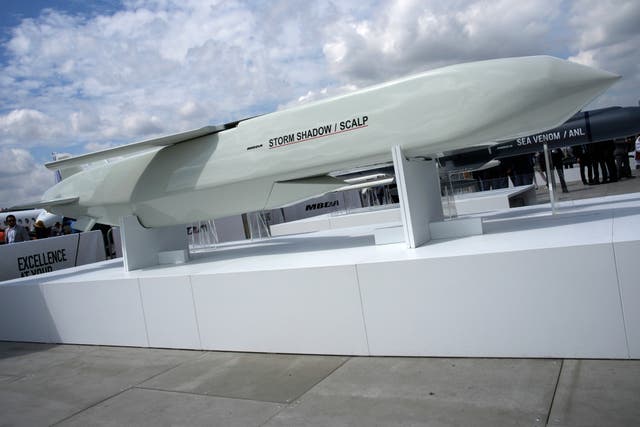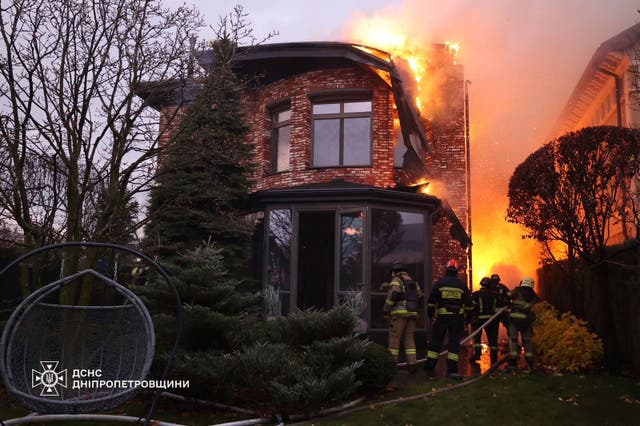Russia’s air defence systems have shot down two British-made Storm Shadow missiles, officials said.
The announcement, which came in the defence ministry’s daily round-up of the “special military operation” in Ukraine, did not say when or where it happened or what the missiles were targeting. It said six HIMARS rockets and 67 drones were also shot down.
The claims came after Ukraine said that Russia launched an intercontinental ballistic missile (ICBM) overnight targeting the city of Dnipro in the east of the country – the first time Moscow has used such a missile in the war.
Ukraine did not provide any evidence that an ICBM, apparently armed with conventional warheads, was used in the attack.
President Volodymyr Zelensky said a missile “matches the speed and altitude” of an ICBM. The Kremlin refused to comment on the strike.

The attack comes in a week when tensions have repeatedly soared, as the US eased restrictions on Ukraine’s use of American-made longer-range missiles inside Russia and the Kremlin lowered its threshold for launching nuclear weapons.
The range of an ICBM — which can exceed 3,400 miles — is beyond what is needed to attack Ukraine. But such missiles are designed to carry atomic warheads, and the use of one, even with a conventional payload, would serve as a chilling reminder of Russia’s nuclear capability and a powerful message of potential escalation.
In a statement on the Telegram messaging app, Ukraine’s air force said an ICBM was fired at Dnipro, along with eight other missiles, and that the Ukrainian military shot down six of them.
Two people were wounded in the attack, and an industrial facility and a rehabilitation centre for people with disabilities were damaged, according to local officials.
The air force statement did not specify the exact type of ICBM but said it was launched from Russia’s Astrakhan region, on the Caspian Sea.
“Today, our crazy neighbour once again showed what he really is,” Mr Zelensky said. “And how afraid he is.”

Ballistic missiles can have a range of anywhere from under 310 miles to more than 3,400 miles in the case of intercontinental ones. “Ballistic” refers to the shape of their trajectory.
Since the Cold War era, Moscow and Washington have given each other advance notice about ICBM launches to prevent the other side from perceiving a test launch as a nuclear attack.
They have stuck to exchanging such warnings despite increasing tensions — which ratcheted up again in recent days.
Earlier this week, the Biden administration authorised Ukraine to use US-supplied, longer-range missiles to strike deeper inside Russia — a move that drew an angry response from Moscow.
Days later, Ukraine fired several of the missiles into Russia, according to the Kremlin. The same day, President Vladimir Putin signed a new doctrine that allows for a potential nuclear response even to a conventional attack on Russia by any nation that is supported by a nuclear power.
The doctrine is formulated broadly to avoid a firm commitment to use nuclear weapons. In response, Western countries, including the US, said Russia has used irresponsible nuclear rhetoric and behaviour throughout the war to intimidate Ukraine and other nations.
They have also expressed dismay at the deployment of thousands of North Korean troops to Russia to fight against Ukraine.





Why are you making commenting on The National only available to subscribers?
We know there are thousands of National readers who want to debate, argue and go back and forth in the comments section of our stories. We’ve got the most informed readers in Scotland, asking each other the big questions about the future of our country.
Unfortunately, though, these important debates are being spoiled by a vocal minority of trolls who aren’t really interested in the issues, try to derail the conversations, register under fake names, and post vile abuse.
So that’s why we’ve decided to make the ability to comment only available to our paying subscribers. That way, all the trolls who post abuse on our website will have to pay if they want to join the debate – and risk a permanent ban from the account that they subscribe with.
The conversation will go back to what it should be about – people who care passionately about the issues, but disagree constructively on what we should do about them. Let’s get that debate started!
Callum Baird, Editor of The National
Comments: Our rules
We want our comments to be a lively and valuable part of our community - a place where readers can debate and engage with the most important local issues. The ability to comment on our stories is a privilege, not a right, however, and that privilege may be withdrawn if it is abused or misused.
Please report any comments that break our rules.
Read the rules hereLast Updated:
Report this comment Cancel